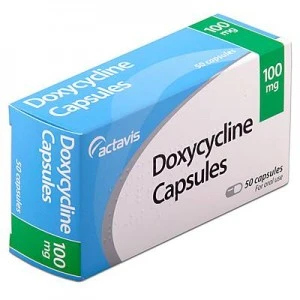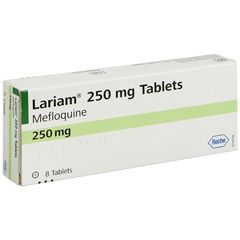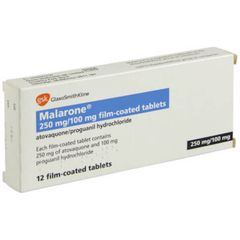- Home
- Treatments (Medications)
- Malaria Prevention
Malaria Prevention
Malaria is a serious parasitic infection transmitted through the bite of infected Anopheles mosquitoes, causing symptoms like fever, chills, and fatigue. Effective prevention and treatment are critical, and malaria management options are accessible via Chemist Doctor’s regulated service after consultation with UK-licensed clinicians.
Find Malaria Prevention Treatments

Doxycycline Capsules

Lariam Tablets

Malarone Tablets
What is Malaria?
Malaria remains a significant global health concern, particularly for travellers visiting tropical regions. According to NHS guidelines, this parasitic infection requires proactive prevention strategies when visiting high-risk areas.
Parasite Transmission Cycle
Malaria develops through five Plasmodium parasite species transmitted by Anopheles mosquitoes:
- Plasmodium falciparum: Most prevalent in Africa (accounts for 99% of malaria deaths)
- Plasmodium vivax: Dominant in Asia and South America
- Plasmodium ovale: Rare West African strain
- Plasmodium malariae: Chronic infection potential
- Plasmodium knowlesi: Emerging Southeast Asian zoonotic strain
Infection Timeline:
- Day 0: Infected mosquito bite
- Day 2-10: Liver stage development
- Day 7-18: Bloodstream invasion (symptom onset)
- Up to 1 year: Possible delayed presentation
Malaria Symptoms
Early malaria symptoms often mimic influenza, typically appearing 7-18 days post-exposure:
- Cyclical fever patterns (48-72 hour cycles)
- Profuse sweating with chills
- Nausea and vomiting
- Muscle pain and fatigue
Symptom Progression
| Phase | Duration | Characteristics |
|---|---|---|
| Cold Stage | 1 hour | Shivering, chills |
| Hot Stage | 2-6 hours | High fever (40°C+), confusion |
| Sweating Stage | 2-4 hours | Drenching sweats, exhaustion |
Diagnosing Malaria
Prompt diagnosis is critical - the NICE guidelines recommend immediate testing for anyone with fever post-travel to endemic areas.
Diagnostic Methods
| Method | Accuracy | Time | Usage |
|---|---|---|---|
| Blood Smear Microscopy | Gold standard | 2-6 hours | Hospital labs |
| Rapid Diagnostic Test (RDT) | 85-95% | 15 mins | Field testing |
| PCR Testing | 98%+ | 24-48 hrs | Species confirmation |
Malaria Treatment Options
Effective malaria treatment depends on timely intervention and appropriate antimalarial selection:
First-Line Treatments
- Artemisinin Combination Therapy (ACT): WHO-recommended for P. falciparum
- Chloroquine: Effective for chloroquine-sensitive strains
- Atovaquone-Proguanil: 94% efficacy for prophylaxis
Malaria Prevention Medications
Choosing Appropriate Chemoprophylaxis
Current UK Health Security Agency guidelines recommend considering these factors when selecting antimalarials:
| Medication | Dosage | Efficacy | Considerations |
|---|---|---|---|
| Atovaquone/Proguanil (Malarone®) | 1 tablet daily Start: 2 days pre-travel Continue: 7 days post-travel |
92-98% | Preferred for short trips Not for pregnancy |
| Doxycycline | 100mg daily Start: 2 days pre-travel Continue: 4 weeks post-travel |
87-95% | Photosensitivity risk Not under age 12 |
| Mefloquine (Lariam®) | 250mg weekly Start: 3 weeks pre-travel Continue: 4 weeks post-travel |
85-95% | Neuropsychiatric risks Requires early testing |
Malaria Prevention Strategies
ABCD Prevention Framework
- Awareness: Check fitfortravel.nhs.uk for regional risks
- Bite Prevention:
- DEET 50% repellents (reapply every 6-8 hours)
- Permethrin-treated clothing
- Insecticide-treated bed nets (WHOPES-approved)
- Chemoprophylaxis: Strict adherence to prescribed regimen
- Diagnosis: Seek immediate testing for febrile illness
Travel Health Essentials Kit
- DEET-based insect repellent (50-55% concentration)
- Digital oral thermometer
- Emergency standby treatment (if recommended)
- Medical alert card detailing prophylaxis regimen
Where Can I Buy Malaria Prevention Online in the UK
Secure Malaria Prophylaxis & Next-Day Delivery Service
Order malaria prevention medication with confidence through our UK-registered travel health specialists, who review all requests within 4 working hours. We guarantee same-day prescription approval for eligible travellers and dispatch orders placed before 3pm for next-day tracked delivery.
Our malaria prevention service includes:
- Destination-specific regimens (Atovaquone/Proguanil, Doxycycline, or Malarone®)
- Dispensed through GPhC-registered pharmacies
- Complete NHS FitForTravel-aligned advice sheets
Our clinical team ensures:
- Full travel itinerary review (including stopovers)
- Medical history screening (e.g., liver/kidney function)
- Personalised dosing schedules based on departure dates
Not a substitute for mosquito precautions: Medications reduce but don't eliminate risk. Seek immediate medical help if experiencing fever during/after travel. Prophylaxis must begin before entering risk areas.
Malaria Prevention FAQs
What is Malaria and how is it transmitted?
Malaria is a serious tropical disease caused by Plasmodium parasites, which are transmitted to humans through the bites of infected female Anopheles mosquitoes. Common symptoms include fever, headaches, nausea, muscle pains, and diarrhoea.
How does Malaria develop in the human body?
Malaria infection progresses through several stages: First, an infected female Anopheles mosquito bites a human for a blood meal. Then, Plasmodium parasites enter the bloodstream and multiply in the liver before invading red blood cells. This cycle causes the characteristic symptoms of fever, chills, and potentially severe complications.
Will I definitely get Malaria if bitten by a mosquito?
Not all mosquito bites lead to Malaria transmission, as only female Anopheles mosquitoes carry the parasite. However, Chemist Doctor strongly recommends taking comprehensive precautions including using antimalarial medication in risk areas, combining it with physical bite prevention methods, and never relying on partial protection.
When are Malaria-transmitting mosquitoes most active?
The highest risk for mosquito bites occurs between dusk and dawn, which are the peak feeding times for Anopheles mosquitoes. For optimal protection, Chemist Doctor recommends using DEET-based repellents (50% concentration for tropical climates), wearing permethrin-treated clothing, sleeping under insecticide-treated nets, and reapplying repellent after sweating or swimming.
Which countries have the highest risk of Malaria transmission?
The most dangerous regions for Malaria include Sub-Saharan Africa (which accounts for 90% of cases), South-East Asia, Pacific Islands, the Amazon Basin, and certain Caribbean locations. Travelers to these areas should take extra precautions.
Can I use the same antimalarial medication in different regions?
Different regions require different antimalarial medications due to varying resistance patterns. Our service provides personalized recommendations based on your travel itinerary, offering WHO-compliant guidelines and automatic updates about resistance patterns in your destination areas.
Is Malaria contagious between people?
Malaria requires specific transmission conditions and cannot spread through casual contact. The disease requires either a mosquito vector or direct blood-to-blood contact, meaning it is not transmitted through airborne particles, casual contact, or sexual intercourse.
How quickly do Malaria symptoms appear after infection?
Symptoms typically appear within 7-30 days after infection, though some strains can remain dormant in the liver for up to a year. We recommend post-travel screening, access to our emergency hotline, and keeping standby treatment kits when traveling to high-risk areas.
How do healthcare professionals diagnose Malaria?
Medical professionals confirm Malaria through several diagnostic methods including blood smear microscopy, rapid diagnostic tests (RDTs), and PCR testing.
Is long-term use of antimalarial medications safe?
Many antimalarials can be safely used for 6-12 months with proper medical supervision. For extended regimens beyond this period, we recommend consultation with a travel medicine specialist and regular health monitoring throughout the medication period.
Is it safe to purchase antimalarial medications abroad?
Purchasing medications abroad carries significant risks. We ensure safety by providing UK-regulated medications, temperature-controlled shipping, batch tracking with authenticity verification, and an online pharmacy service with next-day delivery.
Is there an effective vaccine for Malaria?
While no completely effective vaccine exists yet, the RTS,S vaccine offers partial protection against Malaria. This should be combined with comprehensive prevention plans, and travelers should stay informed about the latest vaccine developments.
What are the Malaria prevention recommendations for pregnant women?
Pregnant women should avoid Malaria zones whenever possible. Essential travelers can access pregnancy-safe prophylaxis options.
How can breastfeeding mothers protect themselves and their babies from Malaria?
While some antimalarial medications pass through breast milk, infants require separate prophylaxis.
Does Malaria become a chronic condition?
Most Malaria strains are completely curable with proper treatment using artemisinin-based combinations that have over 95% efficacy. However, P. malariae may persist for decades without proper treatment, making prompt medical attention crucial.
Can Malaria be completely cured?
With prompt and proper treatment, Malaria can be completely cured.
What are the essential steps for Malaria prevention?
Effective prevention rests on four pillars: prescription prophylaxis medications, DEET-based repellents (50% concentration), permethrin-treated clothing, and proper use of mosquito nets combined with environmental controls.
What types of antimalarial medications are available?
Our comprehensive range includes Atovaquone-Proguanil (available in both brand and generic versions), Doxycycline as a cost-effective option, and Mefloquine for those preferring weekly dosing schedules.
Is it safe to purchase antimalarial medications online?
Purchasing from regulated online services like ours is completely safe, as we provide MHRA-approved medications, secure encrypted transactions, included pharmacist consultations, and guaranteed medication authenticity.
How should I choose the right antimalarial medication?
The ideal antimalarial depends on multiple factors including destination resistance patterns, personal medical history, trip duration, and individual preferences.
How long should I take antimalarial medications?
Medication schedules vary: Malarone/Generic requires daily doses starting 2 days before travel until 1 week after return, Doxycycline follows the same pattern but continues for 4 weeks after, while Mefloquine involves weekly doses starting 3 weeks before travel until 4 weeks after return.
What are the common side effects of antimalarial medications?
Different medications have different side effect profiles: Malarone may cause nausea (reduced by taking with food), Doxycycline increases sun sensitivity (requiring SPF 50+ protection), while Mefloquine requires screening for mental health history before use.
Is generic Malarone as effective as the brand version?
Generic versions contain identical active ingredients and demonstrate the same effectiveness as brand-name Malarone, while offering significant cost savings (up to 60%) and full MHRA approval for quality assurance.
Can people develop immunity to Malaria?
While partial immunity may develop in residents of endemic areas, travelers should never assume they have protection. We recommend prophylaxis for all travelers, with special expat protection plans and immunity testing available for long-term residents.
How long does Malaria immunity last after leaving an endemic area?
Any acquired immunity typically wanes within 6-12 months after leaving malaria-endemic regions. We advise returning visitors to use full prophylaxis and consider immunity status checks.
Can Malaria be fatal?
The P. falciparum strain can prove fatal within 24-72 hours if untreated.
What are the different types of Malaria?
Four dangerous Plasmodium species cause human Malaria: P. falciparum (the most deadly strain), P. vivax, P. ovale, and P. malariae. Each has distinct characteristics and geographic distributions that influence prevention strategies.
What treatment methods are available for Malaria?
Treatment options include oral artemisinin-based combination therapies (ACTs) for uncomplicated cases and intravenous artesunate for severe Malaria, with access available through our global treatment center network.
What are the key differences between Malaria and Yellow Fever?
Malaria is a parasitic disease with chronic risk potential, while Yellow Fever is a viral infection with an available vaccine. Travelers to regions with both diseases should consider combination prevention approaches.
Which countries currently pose the highest Malaria risk?
Current high-risk areas include Sub-Saharan Africa, South Asia, and the Amazon Basin, with specific risk levels constantly changing based on seasonal patterns and disease control efforts.
Is there any connection between Malaria and Dengue fever?
While Malaria and Dengue are completely separate diseases with different causes, they share similar prevention methods including using DEET repellents and eliminating standing water where mosquitoes breed.
Are children at greater risk for Malaria complications?
Children represent a high-risk group for severe Malaria complications.
 | Authored by Nabeel |
Medical Content Manager
Nabeel is a co-founder, and medical content manager of Chemist Doctor. He works closely with our medical team to ensure the information is accurate and up-to-date.
 | Reviewed by Dr. Feroz (GMC:7921697) |
Medical Doctor
Dr. Feroz is a GMC-registered doctor and a medical reviewer at Chemist Doctor. He oversees acute condition and urgent care guidance.
 | Approved by Usman |
Medical Director
Usman is a co-founder, and medical director of Chemist Doctor. He leads the organisation's strategic vision, bridging clinical and operational priorities.
Review Date: 24 May 2025
Next Review: 14 December 2025
Published on: 23 May 2025
Last Updated: 24 May 2025







